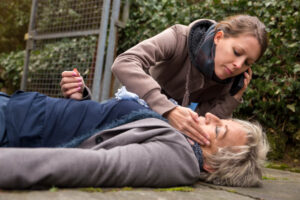Understanding Georgia’s Good Samaritan Law

Under Georgia’s Good Samaritan Law, bystanders who provide aid to someone in need can’t be sued for injuries or death caused during their assistance. This legal protection encourages Good Samaritans to help others without fear of liability.
Many people want to help when they witness an emergency. The Georgia Good Samaritan Law was created to address the worry that a person’s good-faith efforts to help someone in such a situation could lead to them being sued. Generally, under the law, you are free to help others without worrying that you could be sued for your good deeds. However, some exceptions apply.
A personal injury attorney can explain your rights and obligations after an emergency. Car accidents can be complex, so working with a knowledgeable attorney can make all the difference in the results you experience.
What Is a Good Samaritan?
Contents
“Good Samaritan” is a term that comes from a biblical parable about a traveler who helps a needy stranger, even when others choose to pass by. Today, the phrase represents anyone who steps up to assist others in an emergency without expecting anything in return.
Good Samaritan laws exist to encourage bystanders to help others in emergencies without fear of legal consequences. These laws recognize that assistance in critical moments can save lives, and they protect individuals who act in good faith, even if their efforts are ultimately unsuccessful or result in unintended harm. Without these protections, many people hesitate to step in.
How Does Georgia’s Good Samaritan Law Work?
Georgia’s Good Samaritan law (Ga. Code § 51-1-29) ensures bystanders can help others without fear of being held legally responsible if their efforts are unsuccessful or accidentally cause further harm. To qualify for protection under this law, the person offering help must:
- Act in good faith, genuinely trying to help the person in need, and
- Not receive or seek compensation for their actions.
Helping others can take various forms, including:
- CPR – You may perform CPR, including chest compressions or rescue breaths.
- Getting victims out of a vehicle – If someone is trapped in a car after an accident, you can help them escape.
- Calling emergency services – Contacting 911 or notifying first responders about the situation is always allowed.
Because of this law, witnesses to accidents can feel confident stepping in to help, knowing that their good-faith actions are legally protected. Contact our Atlanta traffic collision lawyer today.
Does Georgia’s Good Samaritan Law Protect First Responders?
First responders like EMTs, firefighters, and police officers typically operate under different legal protections than civilians. These professionals are covered by liability statutes and insurance policies specific to their jobs. These insurance policies provide comprehensive coverage for any life-saving actions they take while on duty.
However, Georgia’s Good Samaritan Law can apply to off-duty first responders who voluntarily choose to assist in emergencies. For example, if an off-duty EMT witnesses a car accident and decides to provide aid, they have the same protection under the Good Samaritan Law as any regular person.
Can a Good Samaritan Be Sued If They Do More Harm Than Good?
Worrying about unintended consequences when trying to help someone else is natural, especially in an emergency. If you don’t have medical training or any prior experience helping accident victims, you might be concerned you’ll do more harm than good. For instance, what if you move an accident victim to safety but inadvertently cause further injury? Would you be liable for those consequences?
Fortunately, Georgia’s Good Samaritan Law protects you from legal action in these cases as long as your intentions were good and your actions were reasonable. While it’s possible that an individual could suffer harm despite a Good Samaritan’s best efforts, the law is designed to encourage people to help without fear of lawsuits, as long as they did not act recklessly.
The determining factor in these situations is negligence. Legal negligence occurs when someone fails to meet the standard of care expected in a given situation. For example, when driving, you’re expected to follow the rules of the road and avoid harming others.
Good Samaritan protections apply if your actions are reasonable and align with what a typical person would do in an emergency. If you acted with good intentions and in good faith, you should be shielded from liability even if the outcome is imperfect. In short, the law exists to encourage people to help others in emergencies.
Understanding Georgia’s Good Samaritan law helps you understand your rights and obligations in an emergency. The rule allows people to step in and help without the constant worry of being sued for their actions. This rule encourages more people to take swift, decisive action when someone is in need, and makes the community safer and more helpful in times of crisis.
Contact a Georgia Personal Injury Lawyer
R. Alan Cleveland, LLC has a proven track record of helping our clients recover the compensation they need to heal and move forward. Our Athens personal injury firm provides personalized service and smart legal strategies tailored to our clients’ unique situations. We’ve recovered over $150 million for our clients throughout the firm’s history. Check out some of our case results to see how we’ve helped others in situations like yours.
If you’ve been injured in a car accident or hurt in any accident caused by someone else, our team is here to fight for your rights. Don’t face Georgia insurance companies and courts on your own. Trust R. Alan Cleveland, LLC, to handle your personal injury claim so you can get back on your feet. Contact us today for a free consultation.

An Athens resident Alan Cleveland grew up in Rockdale County. As a founding partner of the personal injury law firm of R. Alan Cleveland, LLC he proudly serves his community and provides skilled representation to injury victims and their families all around Georgia. Alan earned his undergraduate degree from the University of Georgia and went on to graduate, summa cum laude, from Atlanta’s John Marshall Law School. He is also a graduate of Gerry Spence’s renowned Trial Lawyers College (TLC) in Wyoming. In his free time, Alan frequently speaks at continuing legal education seminars. He also volunteered as a youth baseball coach and assists with Georgia’s high school moot court competition held annually. Alan serves as a Trustee of Historic Athens and is a member of the Development Authority of the Unified Government of Athens-Clarke County.
